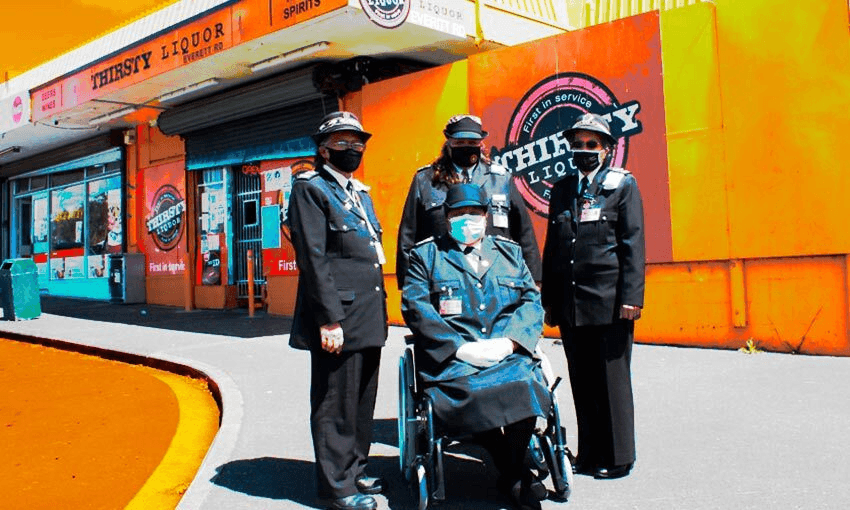Community advocates say Auckland Council needs to bring in new regulations to stem the ongoing harm caused by alcohol. Council says it has run out of time to incorporate them into a new bylaw on signage across the city.
Drive through any South Auckland suburb and it’s hard not to be affronted by the backdrop of brightly painted buildings adorned in gaudy hues of orange, green and blue.
The stores responsible for this visual assault sell all shades of booze and are often found at 500m junctures, nestled within nondescript neighbourhood shopping blocks, invariably with a kindergarten or primary school in close proximity.
In 2019, the Ōtara-Papatoetoe Local Board funded a report into the proliferation of bottle shops in its area, which includes Ōtara, Papatoetoe, East Tāmaki and Manukau, and found there were 33 off-licences within its boundaries. Only the CBD’s entertainment district had a higher concentration of liquor outlets.
But having so many bottle shops concentrated in one area goes well beyond just keeping thirsts quenched. Māori warden Mereana Peka says given how accessible liquor stores are, it’s no wonder so much alcohol harm is being caused. “You have a bottle store right next to every dairy or takeaway shop and our kids walk past these places every single day. It’s become the norm but it shouldn’t be.”
Auckland Regional Public Health Service (ARPHS) medical officer of health Dr Nick Eichler says research backs up Peka’s concerns, adding that the brazen signage on liquor shops has been found to actually trigger a person’s impulse to drink more. “Because the stores are often brightly coloured with bright orange or green signs, they are designed to cue you to drink and the more of these you see the more likely you are to think about buying alcohol,” he says.
“We know that particularly for low income communities, social deprivation is linked to the risk of developing addictions, so if you’ve already got a high alcohol intake plus you’re getting all these environmental cues, it’s very normalised and that makes it a lot more difficult to cut down on your drinking.”
Another Māori warden, Olive Wallace, says limiting how bottle shops advertise themselves would make a massive difference for places like Ōtara, where she also serves as an Anglican minister. “Alcohol has a huge effect on our whānau, through the abuse that happens in the home and through to suicide levels and it’s not affecting just one person, it’s happening right across whānau.”
She says she’s “been to too many tangi and funerals where alcohol was the cause”.
Peka says taking up this fight is in part a way for her to carry on the crusade of her mother, who was also a Māori warden. “She would go into the pubs around Ōtara and Ōtāhuhu and pull out the men and say go home and look after the kids. There were fights and jugs flying and my mum was in there amongst all of that. So for me, this is about carrying on my mum’s legacy – and that’s why I gave up a paid job, to do a volunteer role to try and stop the impact alcohol has on our community.”
Wallace and Peka, along with fellow wardens Atawhai Hauwai and Kathleen Ahpene, have joined forces with advocacy group Communities Against Alcohol Harm (CAAH) to campaign for tighter rules on how liquor stores market themselves. They are calling on people who support their campaign to submit their concerns to Auckland Council as part of a consultation process currently being undertaken.
CAAH secretary Grant Hewison says the council should take a harder line on regulating this industry. “We have all these lolly-coloured stores selling lolly-flavoured drinks to teenagers, and it’s the brightly coloured signs that’s attracting them. Auckland Council are meant to be looking after our communities, but they’re saying ‘nah we’re not going to do anything about this’.”
Council refutes the claim, with a spokesperson telling The Spinoff, via written statement, that it had simply run out of time to incorporate alcohol advertising regulations into its new signage bylaw.
In a report presented to the regulatory committee in 2020, council officers also highlighted that limiting alcohol signage would result in “significant compliance costs” for businesses and was “potentially inconsistent with the New Zealand Bill of Rights Act”.
Hewison says it is “disappointing” that council did not leave itself sufficient time to investigate community concerns, especially as these have been expressed over many years. But he believes if enough people complain about the ugly bottle stores in their local areas, council will get the message that change is needed.
“When the result of this consultation comes through, then we can say to the council, ‘well you have to deal with this, you can’t shy away from this, given there’s an overwhelming response from the community’.”
Auckland Council has also confirmed that submissions made during this consultation will help inform council’s advocacy in this area. “The council intends to advocate to central government for tighter national restrictions on alcohol marketing, similar to the ones for tobacco products, and feedback received during this consultation can be used to support that purpose,” the spokesperson said.
In the meantime, South Auckland’s liquor stores will continue to be colourfully stark reminders of the community harm that Olive Wallace and Mereana Peka find themselves addressing every day as Māori wardens.
Public consultation on the proposed new signage bylaw closes on October 27.
